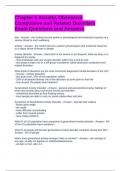-
1. Exam (elaborations) - Abnormal psych exam ii questions with correct answers
-
2. Exam (elaborations) - Abnormal psychology anxiety disorders exam questions and answers
-
3. Exam (elaborations) - Abnormal psychology chapter 6 anxiety and ocd exam questions and answers
-
4. Exam (elaborations) - Anxiety and obsessive-compulsive disorders - practice exam questions and answers
-
5. Exam (elaborations) - Anxiety disorder hdfs 314 practice exam questions with correct answers
-
6. Exam (elaborations) - Anxiety disorders and obsessive exam questions and answers
-
7. Exam (elaborations) - Anxiety disorders and ocd - exam 4 questions and answers
-
8. Exam (elaborations) - Anxiety disorders and stress nclex practice exam questions with correct answers
-
9. Exam (elaborations) - Anxiety quiz questions with latest update
-
10. Exam (elaborations) - Anxiety disorders test bank exam questions with latest update
-
11. Exam (elaborations) - Anxiety disorders psychopathology exam questions and answers
-
12. Exam (elaborations) - Anxiety disorders psych test 1 exam questions with correct answers latest update
-
13. Exam (elaborations) - Anxiety disorders practice exam questions with latest update
-
14. Exam (elaborations) - Anxiety disorders nclex exam questions with correct answers
-
15. Exam (elaborations) - Anxiety disorders mastery exam questions and answers
-
16. Exam (elaborations) - Anxiety disorders exam questions and answers
-
17. Exam (elaborations) - Anxiety disorders exam questions and answers latest update
-
18. Exam (elaborations) - Ch.15. anxiety related disorders exam questions and answers
-
19. Exam (elaborations) - Ch.11 anxiety and ocd exam questions with correct answers
-
20. Exam (elaborations) - Care of the patient with anxiety disorders exam questions and answers latest update
-
21. Exam (elaborations) - Anxiety, obsessive-compulsive, and related disorders assessment exam questions and an...
-
22. Exam (elaborations) - Anxiety related disorders exam questions with correct answers
-
23. Exam (elaborations) - Anxiety disorders exam 1 questions and answers
-
24. Exam (elaborations) - Chapter 5 anxiety, obsessive compulsive and related disorders exam questions and answ...
-
25. Exam (elaborations) - Chapter 6 anxiety disorders multiple choice exam questions with correct answers
-
26. Exam (elaborations) - Chapter 14 anxiety and anxiety disorders exam questions with latest update
-
27. Exam (elaborations) - Chapter 15 anxiety exam 2 questions with complete solutions
-
28. Exam (elaborations) - Theories exam 5 - anxiety disorders ch 29 questions and answers
-
29. Exam (elaborations) - Psych exam 2 lecture anxiety disorders diagnostic criteria questions and answers
-
30. Exam (elaborations) - Psych exam 1- anxiety disorders questions and answers
-
31. Exam (elaborations) - Psych 600 final exam (anxiety disorders) questions with complete solutions
-
32. Exam (elaborations) - Psyc 3560 exam 2 learning objectives (anxiety disorders) questions and answers
-
33. Exam (elaborations) - Nur 416 anxiety exam questions with complete solutions
-
34. Exam (elaborations) - Mh practice questions anxiety, ocd, and related disorders exam questions with latest ...
-
35. Exam (elaborations) - Mh exam 3 sample questions anxiety questions and answers
-
36. Exam (elaborations) - Mental health test 2 anxiety disorders exam questions with complete solutions
-
37. Exam (elaborations) - Mental health nursing - chapter 15 - anxiety disorders exam questions with latest upd...
-
38. Exam (elaborations) - Mental health exam 2 anxiety disorders questions with correct answers
-
39. Exam (elaborations) - Mental health exam 2- anxiety disorders questions with complete solutions
-
40. Exam (elaborations) - Mental health exam 1 ch. 18 anxiety, obsessive-compulsive and related disorder questi...
-
41. Exam (elaborations) - Mental health exam (anxiety disorders) questions with verified answers
-
42. Exam (elaborations) - Mental health anxiety disorders exam 4 questions with correct answers
-
43. Exam (elaborations) - Mental exam 2 chapter 14 anxiety & anxiety disorders questions and answers
-
44. Exam (elaborations) - Intro to psychology anxiety disorders exam questions and answers
-
45. Exam (elaborations) - Exam 3 chapter 15, anxiety and obsessive-compulsive disorders questions and answers
-
46. Exam (elaborations) - Exam 2 practice questions anxiety disorder with latest update
-
47. Exam (elaborations) - Exam 1 - anxiety & crisis (nursing 3) questions and answers
-
48. Exam (elaborations) - Dsm-5 anxiety disorders exam questions and answers
-
49. Exam (elaborations) - Chronic exam 2- prep u ch 14- anxiety questions with correct answers
-
Show more




